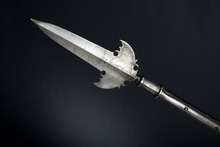Partisan (weapon)
A partisan (also partizan) is a type of polearm that was used in Europe in the 16th, 17th, and 18th century.[1][2][3] It consisted of a spearhead mounted on a long shaft, usually wooden, with protrusions on the sides which aided in parrying sword thrusts. Like the halberd, it quickly became obsolete with the arrival of practical firearms, although it stayed in use for many years as a ceremonial weapon. In profile, the head of a partisan may look similar to that of a ranseur, spontoon, ox tongue, or spetum; however, unlike a ranseur, the lower parts of the head have a sharpened edge.

.jpg)
Cultural references
The partisan is briefly mentioned by the character Marcellus in William Shakespeare's play Hamlet, Act I, Scene 1:[4]
Marcellus: Shall I strike at it with my partisan?
It is also mentioned in Sir Walter Scott's novel Ivanhoe:
I say, brethren, such a fool shall never want a wise clerk to pray for or fight for him at a strait, while I can say a mass or flourish a partisan.
References
- "Melee weapons: Partisan". All Things Medieval. Retrieved 28 October 2014.
- "Medieval polearms". Weapons Universe. Retrieved 28 October 2014.
- "Definition of partisan (weapon)". Merriam-Webster Dictionary. Retrieved 28 October 2014.
- "The Tragedy of Hamlet". The Tragedy of Hamlet. folgerdigitaltexts.org. Retrieved 8 January 2019.